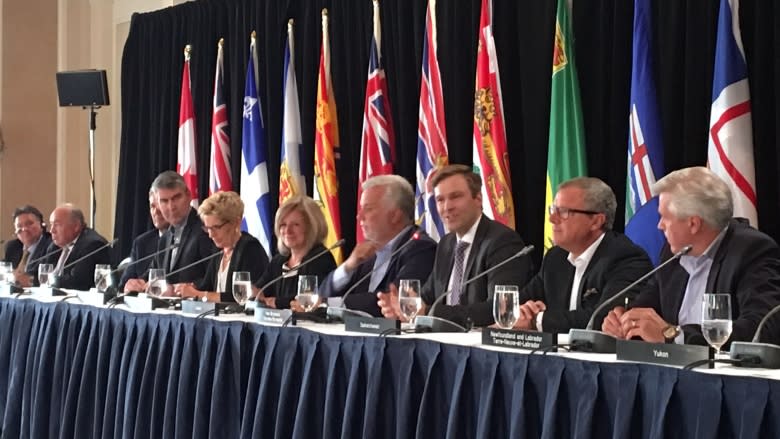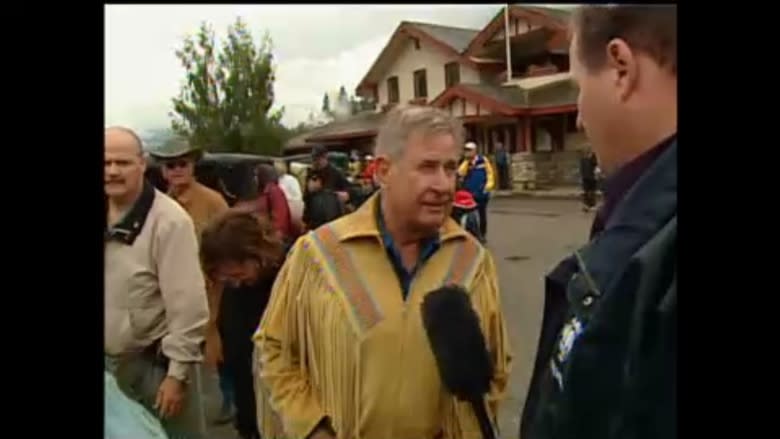Alberta government ditches corporate sponsorships at Council of the Federation meeting
The Alberta NDP government broke with long-standing tradition when it hosted the annual summer meeting of Canada's premiers and territorial leaders in Edmonton this week.
It scaled back the event to cut costs, and remove what has become a reliance on corporate sponsorships.
When the Alberta government began looking at the Council of the Federation (COF) budget for the meeting, it became clear much of the funding came from "corporate sponsorships," said Cheryl Oates, communications director for Premier Rachel Notley.
Decided to explore options
"Rather than give people access for funding, we decided to explore other options," said Oates.
One option, said Oates, was to ask the Council of the Federation for additional funding to host the meeting, since the hosting budget hadn't been increased for a number of years.
"We wanted to make sure that we weren't offering those companies or organizations who could afford to ... access [to] the premiers because they could pay for it," said Oates.
The decision to eliminate corporate sponsorship shouldn't "come as a surprise," she added.
"We introduced Bill 1 where we banned union and corporate [political] donations. This sort of follows that same logic," said Oates, pointing out that not having corporate sponsors made the agenda more flexible.
"It's much nicer for us to build an agenda that doesn't have to build in corporate time or meetings with other people," she said.
Corporations and organizations were not cut out of the event entirely, said Oates.
Some groups that may have been in a position to be a sponsor were invited to receptions and dinners.
The core budget for the annual summer meeting attended by all premiers, territorial leaders and staff, is covered by the COF.
It has become the usual practice to use corporate sponsorship to top up spending, according to COF executive director Loretta O'Connor.
"There would be less money available for the summer meeting [by] not having sponsors, and for that reason and other reasons, Alberta decided to scale back the meeting and not have as many special events and keep it to a much more focused business meeting," said O'Connor.
The reliance on corporate sponsorship has varied, according to O'Connor.
"In some years, there was maybe more sponsorship, but others may have been in the order of $100,000 to $200,000," said O'Connor.
"We thought it was important to send a message we weren't doing a COF of old days where we saw a lot of luxury, but rather one where it was centred around the meeting, and the work of the premiers," said Oates.
As an example of the modest approach taken in Edmonton, the usual lengthy opening night reception was kept to a firm one hour and 45 minutes.
The cramped venue at the Art Gallery of Alberta was limited to delegates, media and a few invited guests, causing some special interest groups to crash the gathering to sneak a peak.
All sponsored
By contrast, the last time Alberta hosted the COF summer meeting in August 2005, premiers traveled to Banff from Calgary on a steam engine train, and were treated to a private rodeo at the Kananaskis Guest Ranch, where they arrived in a procession of antique cars. There were extravagant riverbank dinners with ice wines, steak and all the trimmings.
When asked by a CBC reporter about the extravagance of the event, then premier Ralph Klein quipped, "You don't have to worry about it. Taxpayers aren't paying for it, it's all sponsored."
At that time, the bill was expected to be under $1 million.
The COF was formed in 2003, as a way for premiers to formalize the practice of meeting every summer and seeking consensus on mutual issues, according to O'Connor.
O'Connor said about $250,000 was budgeted for the Edmonton meeting, but final numbers haven't been tabulated.
O'Connor said the COF is funded by each province and territory based on population. The funding is used to operate a small secretariat office in Ottawa and host the annual summer meeting.




